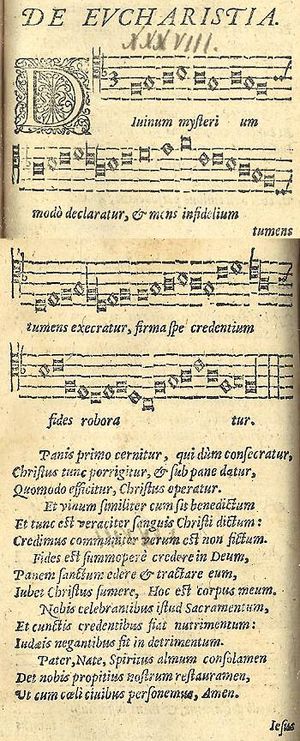Of the Father's Heart Begotten facts for kids
Quick facts for kids Of the Father's heart begotten |
|
|---|---|

The original plainsong of "Divinum mysterium" in Piae Cantiones
|
|
| Native name | Corde natus |
| Genre | Christmas carol |
| Text | Aurelius Prudentius, translated by John Mason Neale, Henry W. Baker, Roby Furley Davis |
| Based on | John 3:16 |
| Meter | 8.7.8.7.8.7.7 |
| Melody | "Divinum mysterium" |
| Published | 1582 |
"Of the Father's heart begotten" is a well-known hymn often sung as a Christmas carol. It is also sometimes called "Of the Father's love begotten". This song is based on a Latin poem named "Corde natus" by a Roman poet called Aurelius Prudentius. He wrote this poem as part of his book Liber Cathemerinon.
Contents
The Song's Long History
This ancient poem was later put together with a very old church melody. This melody is a type of Gregorian chant called "Divinum mysterium". Plainchant is a simple, old style of church music sung without instruments. "Divinum mysterium" was originally a "Sanctus trope." This means it was an old plainchant melody that had extra musical parts added to it over many years.
Early Beginnings
An early version of this melody was found in old handwritten books as far back as the 900s. These early versions did not have the extra musical parts yet. Different versions of the "trope" (with added melodies) appeared in manuscripts from various countries. These include Italy, Germany, and Spain, dating from the 1200s to the 1500s.
First Printed Version
The melody "Divinum mysterium" first appeared in a printed book in 1582. This was in a Finnish songbook called Piae Cantiones. This book was a collection of 74 sacred and school songs from medieval Europe. It was put together by Jaakko Suomalainen. In this collection, "Divinum mysterium" was listed under "De Eucharistia." This shows it was originally used for the church service known as the Mass.
Combining Words and Music
The words of Prudentius's poem were later used with the "Divinum mysterium" melody. This happened when Thomas Helmore published it in 1851. When these two parts were joined, the original rhythm of the melody changed. It went from a "triple metre" (like a waltz, with three beats per measure) to a "duple metre" (like a march, with two beats per measure). This also changed how the words were stressed and how long the notes were held.
Later, Charles Winfred Douglas (1867–1944) made a new version. He tried to fix the rhythm to be closer to the original. Today, you can find the hymn sung in both the changed version and Douglas's corrected version. Some people even sing it in a way that sounds more like a dance.
Different English Versions
Today, there are two main English translations of this hymn that people commonly sing. One was created by John Mason Neale and Henry W. Baker. The other was done by Roby Furley Davis.
Neale's Translation
Neale's first translation started with "Of the Father sole begotten." It was in his book Hymnal Noted (published in London, 1851). This early version had only six stanzas (or verses) from the original Latin poem, which had 38. It was Neale's music editor, Thomas Helmore, who put this hymn together with the Latin plainchant melody.
Later, Henry W. Baker edited Neale's translation. He also added more stanzas, making it nine verses long. This updated version was published in Hymns Ancient and Modern in 1861.
Davis's Translation
Roby Furley Davis (1866–1937) was not happy with Neale's translation. So, he wrote a completely new version for The English Hymnal in 1906. Davis was a smart scholar at St John's College, Cambridge. He also worked as an assistant teacher at Weymouth College.
Davis's translation was also used in the very popular Carols for Choirs series. This series was put together by David Willcocks.
Comparing the Texts
Here are some parts of the original Latin poem by Prudentius and how they were translated into English. You can see how the two main English versions are similar and different.
| Latin text by Prudentius (born 348) |
Translation by Roby Furley Davis for The English Hymnal (1906) |
Translation by J. M. Neale, extended by Henry W. Baker (1851/1861) |
|---|---|---|
|
Corde natus ex parentis |
Of the Father's heart begotten, |
Of the Father's love begotten, |
|
Ipse iussit et creata, |
By His Word was all created |
At His Word the worlds were framèd; |
|
O beatus ortus ille, |
O how blest that wondrous birthday, |
O that birth forever blessèd, |
|
Psallat altitudo caeli, |
Sing, ye heights of heaven, his praises; |
O ye heights of heaven adore Him; |
|
Tibi, Christe, sit cum Patre |
[stanza omitted] |
Christ, to Thee with God the Father, |
 | Kyle Baker |
 | Joseph Yoakum |
 | Laura Wheeler Waring |
 | Henry Ossawa Tanner |

